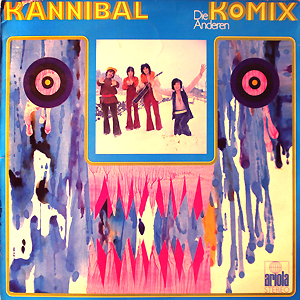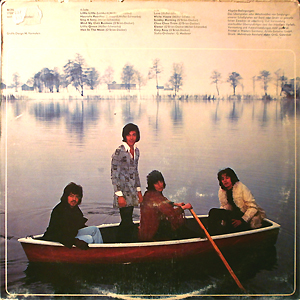

1970
Enrico Lombardi, Gerd Müller
LP "Kannibal Komix"
Ariola 80 295 IT


In order to explain the name confusion: This group should have been big in USA! Certainly the German name wouldn't suit the English tongue.
Would you believe, that in 1969 house-size billboards on Sunset Strip announced the arrival of the amazing German group Apocalypse? The whole promotion train was on it's way, with advertising in the underground press, jingles on west coast FM radio, posters, flags and stickers in record shops, giveaways along with Ampex Tapes products, a feature film licensed to the TV, all the gimmickry! And right on the peak of activities Colossus Records collapsed! While label mates like Shocking Blue or George Baker Selection (hugely successful in continental Europe) were warmly welcomed by Warner Bothers, the bankruptcy pulled this group's overseas career down to the rubble.
But also at home things weren't going on well. Apocalypse shares the ill fate of a quite a few overproduced artists from the psychedelic era. The problem of all these groups was: They weren't The Beatles! Without a well off backdoor mentor this means: They had to perform live! But these young debuting groups hardly could reproduce the studio arrangements on stage. What happens if a band cannot perform the songs they had gained recognition for? The audience will be left hugely unsatisfied. In the worst case the word will be spread about a band being unable to perform decently at all. In the end result our strict German counterculture scholars (I talk about music journalists) would refuse to include the well deserved chapter to the Krautrock chronicles.
This happened to Die Anderen / Apocalypse. Apart from some well informed Krautrock aficionados they were are all but forgotten for decades. In 2004 their two albums were reissued in gorgeous packaging. But still: A very detailed and well done TV Krautrock documentary ("Kraut & Rüben" 2006, 6 episodes) oversaw them again! Much too odd!
Is this a revenge on the fact that former front man Jürgen Drews successfully continues one of the longest lasting Schlagersänger careers of the republic? His German version of the Bellamy Brothers' "Let Your Love Flow" has become an evergreen ("Ein Bett im Kornfeld" - a bed in the cornfield for the lovers, guess what happens next).

The story of Die Anderen starts around 1965 in Kiel with several rivalling Bands taking part in Battle Of Bands contests. One winning band -The Monkeys- got an offer to produce a record. The offer was combined with the requirement of the change of style. The folk and gospel repertoire didn't seem appropriate for recording career. This led to line-up changes, drawing members from other groups. The resulting quartet called themselves the Chimes Of Freedom. The rivalling figures inside the new band were the aforementioned singer and lead guitarist Jürgen Drews, the budding show biz pro and drummer Bernd Scheffler, the musical idealist. Other members were Italian born Enrico Lombardi (b, voc) and Gerd Müller (not the soccer player, g, voc).
In the beginning Scheffler was the stronger force, which led to turning down of offers that were considered 'too much commerce'. The manager of The Lords happened to become aware of the aspiring group. He purposed that he himself should further on take care on their business and it would be a great idea to develop a profile as a specific German group with German name and German lyrics. And since everything should be 'different' about the group, he purposed the name 'Die Anderen', which translates into both "the different" and "the others". In fact thanks to extravagant -near gay- dressing style, they even looked pretty different and they adopted the new name. Nothing seemed to work out with the German lyrics. So they ended up as a band with German name and English lyrics.
In 1967 they used the chance of a TV-contest well enough to win in the branch "vocal group with instrumental accompaniment". Ariola Records offered a contract and decided to invest considerable money to kick off their career. In house producer Giorgio Moroder was consulted. Several TV appearances were arranged, one with large symphonic orchestra. Finally the first album was recorded at Pye Studios in London. Recording in Swinging London! What a honour! The Munich resident American film director George Moorse came to hear the not yet published end product. He arranged group and album to be actors and soundtrack for his upcoming film project "Das weiße Haus" ("the white house"). This resulted in an absurdist haunted-house comedy, much in the same vein as "Magical Mystery Tour". The album debut "Kannibal Komix" was promoted along with the TV screening of the movie.
But as it is often the case with ambitious projects: Despite all the medial circus, the record did not do very much on the market. There was no charting single to gain attraction. Late 1968 saw super groups, prog and heavy rock to come in full bloom and overproduced psychedelic pop getting out of fashion. And not every song on the album is a killer! This might drag the overall impression down to a "much gimmickry with lack of substance" kind of impression. But anyway, if you pick the gems and leave out the misses, you might find half of the album to be worthy tracks, that would do pretty well on any Bam-Caruso psychedelic comp! So much for sure there is substance. Bernd Scheffler was most unhappy with the development, arguing the band had been burned out by the business before it had a chance to ripe naturally.
Consequently the next step for the group was a decent prog rock album. And man, didn't the group and producer Giorgio Moroder do a great job? They did! "Apocalypse" is one of those much too much underrated early Krautrock albums and as such stands on par with the early works of Joy Unlimited or Lucifer's Friend. The loose concept is about the joys and sorrows of the everyday-man's live, told from an upraised hero's perspective (which explains the album title). The music ranges from Led Zep inspired heavy rock, sophisticated pocket operettas and beautiful ballads. All with the considerable vocal-harmony capabilities, solid guitar work and tight rhythm section.
The prospects were promising. In Hamburg they had an audition to American business men. These were the guys from Colossus Records, who successfully had specialised in promoting continental talent (namely Benelux) in the USA. Now they were in Hamburg and two bands were in focus. The competing group was Achim Reichel's Wonderland. The decision was taken in favour of the group with the weird German name. Certainly the name was the first thing to be changed in order to avoid confusion about "who is this Anderen and why is he about to die?".
But the decision to re-name the group equal to their latest album, "Apocalypse" was fatal for their German career, since no one seemed to know what to make of that name no one had ever even heard about. The prospected US career went to dust, while the struggling touring band had no idea what was happening on the business side.
Finally it appeared that all those ambitious efforts and the whole media circus had led to nowhere! Not even a decent cult status, that might have attracted spectators or gained devoted fans. So it would take the band not too long to call it's quits. Bernd Scheffler would stop making music for good. Jürgen Drews would enjoy a long membership in the overly successful Les Humphries Singers before launching his lasting career as Schagersänger.